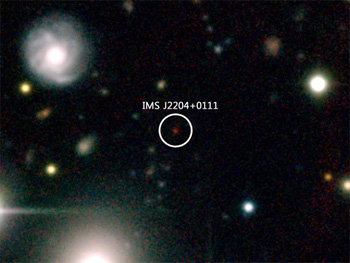Korean researchers discover 12.8 billion-year-old black hole
Korean researchers discover 12.8 billion-year-old black hole
Posted November. 10, 2015 08:40,

A Korean research team has found a new black hole generated 12.8 billion years ago during the early stage of creation of space. The finding is stirring much interest in the astronomical circles in and out of the country as it can provide a source of analysis on what happened during the early period of space creation. This marks the third time that an early-stage black hole has been found following the Canadian research team in 2011 and the Japanese in early 2015.
Through the Gemini Observatory, the gigantic 8-meter diameter twin telescopes stationed in Hawaii and Chile, a "Quasar," a celestial phenomenon that mirrors the existence of a black hole has been discovered, senior Researcher Kim Min-jin of the Korea Astronomy and Space Science Institute and Professor Lim Myeong-shin of Physics and Astronomy Department at Seoul National University said on Monday.
Black holes are invisible as they even absorb light. Instead of black holes, scientists pay keen attention to the quasar phenomenon in which space dusts and other substances around generate bright light while sucked into the core because there is always a black hole at the center of the quasar.
The research team gave the new black hole a proper noun called "IMS J2204+0111." In that it is one of the oldest black holes, it appears that the black hole could help discover some of the mysteries behind the creation of space. Spectroscopic inspection on the light emanating from the quasar in question to the earth can help find out what happened during the early period of space creation.
The findings on the new black hole have been introduced in the latest issue of "The Astrophysical Journal Letters."
enhanced@donga.com
Headline News
- N. Korea launches cyberattacks on S. Korea's defense companies
- Major university hospital professors consider a day off each week
- Italy suffers from fiscal deficits from ‘Super Bonus’ scheme
- Inter Milan secures 20th Serie A title, surpassing AC Milan
- Ruling and opposition prioritize spending amid tax revenue shortfalls







